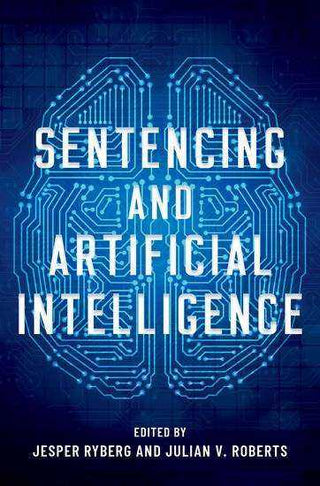Sentencing and Artificial Intelligence
- Unit price
- / per
-
Author:RYBERG Jesper / ROBERTS Julian
-
ISBN:9780197539538
-
Publication Date:November 2022
-
Edition:1
-
Pages:296
-
Binding:Hardback
-
Publisher:Oxford University Press
-
Country of Publication:United Kingdom


A Back Order button means that we don’t have the book in stock at our store. It may already be on order – or we can order it for you from a publisher or distributor at no additional cost.
As we source items from around the globe, a back-order can take anywhere from 5 days to several weeks to arrive, depending on the title.
To check how long this might take, you’re welcome to contact us and we can provide an ETA or any other information you need. We recommend checking the timeframe before committing to an online order.
Sentencing and Artificial Intelligence
- Unit price
- / per
-
Author:RYBERG Jesper / ROBERTS Julian
-
ISBN:9780197539538
-
Publication Date:November 2022
-
Edition:1
-
Pages:296
-
Binding:Hardback
-
Publisher:Oxford University Press
-
Country of Publication:United Kingdom
Description
The first collective work devoted exclusively to the ethical and penal theoretical considerations of the use of artificial intelligence at sentencing
Is it morally acceptable to use artificial intelligence (AI) in the determination of sentences on those who have broken the law? If so, how should such algorithms be used - and what are the consequences?
Jesper Ryberg and Julian V. Roberts bring together leading experts to answer these questions. Sentencing and Artificial Intelligence investigates to what extent, and under which conditions, justice and the social good may be promoted by allocating parts of the most important task of the criminal court - that of determining legal punishment - to computerized sentencing algorithms. The introduction of an AI-based sentencing system could save significant resources and increase consistency across jurisdictions. But it could also reproduce historical biases, decrease transparency in decision-making, and undermine trust in the justice system. Dealing with a wide-range of pertinent issues including the transparency of algorithmic-based decision-making, the fairness and morality of algorithmic sentencing decisions, and potential discrimination as a result of these practices, this volume offers a valuable insight on the future of sentencing.
Adding product to your cart
You may also like
A Back Order button means that we don’t have the book in stock at our store. It may already be on order – or we can order it for you from a publisher or distributor at no additional cost.
As we source items from around the globe, a back-order can take anywhere from 5 days to several weeks to arrive, depending on the title.
To check how long this might take, you’re welcome to contact us and we can provide an ETA or any other information you need. We recommend checking the timeframe before committing to an online order.
You may also like
You may also like
-
The first collective work devoted exclusively to the ethical and penal theoretical considerations of the use of artificial intelligence at sentencing
Is it morally acceptable to use artificial intelligence (AI) in the determination of sentences on those who have broken the law? If so, how should such algorithms be used - and what are the consequences?
Jesper Ryberg and Julian V. Roberts bring together leading experts to answer these questions. Sentencing and Artificial Intelligence investigates to what extent, and under which conditions, justice and the social good may be promoted by allocating parts of the most important task of the criminal court - that of determining legal punishment - to computerized sentencing algorithms. The introduction of an AI-based sentencing system could save significant resources and increase consistency across jurisdictions. But it could also reproduce historical biases, decrease transparency in decision-making, and undermine trust in the justice system. Dealing with a wide-range of pertinent issues including the transparency of algorithmic-based decision-making, the fairness and morality of algorithmic sentencing decisions, and potential discrimination as a result of these practices, this volume offers a valuable insight on the future of sentencing.
-
-
Author: RYBERG Jesper / ROBERTS JulianISBN: 9780197539538Publication Date: November 2022Edition: 1Pages: 296Binding: HardbackPublisher: Oxford University PressCountry of Publication: United Kingdom
The first collective work devoted exclusively to the ethical and penal theoretical considerations of the use of artificial intelligence at sentencing
Is it morally acceptable to use artificial intelligence (AI) in the determination of sentences on those who have broken the law? If so, how should such algorithms be used - and what are the consequences?
Jesper Ryberg and Julian V. Roberts bring together leading experts to answer these questions. Sentencing and Artificial Intelligence investigates to what extent, and under which conditions, justice and the social good may be promoted by allocating parts of the most important task of the criminal court - that of determining legal punishment - to computerized sentencing algorithms. The introduction of an AI-based sentencing system could save significant resources and increase consistency across jurisdictions. But it could also reproduce historical biases, decrease transparency in decision-making, and undermine trust in the justice system. Dealing with a wide-range of pertinent issues including the transparency of algorithmic-based decision-making, the fairness and morality of algorithmic sentencing decisions, and potential discrimination as a result of these practices, this volume offers a valuable insight on the future of sentencing.
-
Author: RYBERG Jesper / ROBERTS JulianISBN: 9780197539538Publication Date: November 2022Edition: 1Pages: 296Binding: HardbackPublisher: Oxford University PressCountry of Publication: United Kingdom
-



